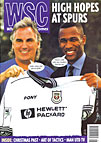 Where have all the interesting characters in football gone?
Where have all the interesting characters in football gone?
Strange times when you find yourself agreeing with a well-worn cliché, but there simply aren’t the characters in the game anymore. What other explanations can there possibly be for television’s continued obsession with John Burridge? Over the past 12 months he has been beamed into living rooms, firstly in the Tyne Tees region, then nationwide, sporting comedy sideburns, singing, asking Fabrizio Ravanelli if he liked fish and chips and, more recently, embracing his old mum on Match of the Day.
On every one of these occasions Burridge has displayed a total lack of self-consciousness, allied to the dress sense of a middle-aged metalwork teacher at the Sixth Form Xmas party, which are the twin hallmarks of a 24-carat football character. With Paul Gascoigne seemingly on sabbatical (“I’ve tried putting the smile back on the face of football and been slaughtered for it,” he lamented recently) it’s hardly surprising that Burridge is in demand, or that his appearances are traditionally followed by the wry chuckles of presenters and pundits basking in the warmth of “a real one-off”. But at a time when top level football is being presented in such a po-faced and portentous manner (from the inane choral introduction to the Champions League to the oh-so-serious opening titles to Match of the Day) television’s increasing tendency to patronize football outside the Premiership should be a cause for concern.
Of course it could just be that TV’s notion of what constitutes a ‘character’ (or indeed the whole concept) is fundamentally flawed. As football supporters know only too well, when documentary film makers seek out fans they are not seeking a cross section of the sort of people who go to football matches regularly – they want lunatics who paint their dogs in club colours and name new-born babies after cup-winning teams. Mad people are deemed to make ‘good’ (ie easy) TV. Increasingly, a similar philosophy seems to be used when selecting current and former players to interview. It appears that for TV only those football people for whom the dividing line between a career in the game and a term in psychiatric care is so fine it cannot be discerned, even after replays from a variety of angles, are considered worthy of being officially declared to be a ‘character’.
The problem is particularly noticeable when TV turns aside momentarily from the glamour of the Premiership and lowers itself into the murky depths of the Nationwide. In the old days when terrestrial channels covered football at all levels hardly a week went by without some reporter who had drawn the short straw being dispatched to the outer reaches of football to deliver a jovial piece about how the town butcher was helping his team’s Cup run by donating a black pudding to every goalscorer. At the report’s conclusion, the anchorman back at base would offer up a wry chuckle before saying to their co-pundit, “Despite the money flowing into football, these sort of people are very much the lifeblood of the game, aren’t they?”
Other, more serious, reports did filter through, however. Features on former internationals playing out their careers in less august surroundings, of once highly-rated youngsters attempting to resurrect their careers, of successful youth policies at places such as Turf Moor or Gresty Road, added to the viewer’s understanding of the game as a whole. It was informed comment for an informed audience. Nowadays, with the BBC parading the Premiership and ITV contributing to the bombast that surrounds the Champions League (and in the process giving over far too much time to pundits chosen for their perceived ‘presence’ rather than because they have anything to communicate) far less in-depth coverage of lower division football appears on terrestrial channels. And what does make it to our screens portrays football below the top level as the playground of eccentrics, a land of daftness and inanity. There are plenty of football people who have interesting things to say, but we rarely get to hear them: Barry Fry will always win out over Dario Gradi.
We’re being fed a view of football as seen from the top of the Premiership, where success and visible wealth are all that matter, and Football League clubs are taken seriously only if they harbour ambitions of moving up to the top level. The remainder might just as well display outside their grounds one of those signs that are meant to brighten up drab offices, ‘You Don’t Have To Be Mad To Work Here But It Helps’. In fact don’t be surprised if something like that turns up soon as a closing shot before we cut back to the studio and the smirking presenter.
From WSC 131 January 1998. What was happening this month